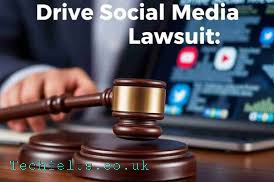In recent years, social media platforms have become an integral part of our daily lives. From connecting with friends and family to shaping global conversations, these platforms have revolutionized how we communicate. However, with great power comes great responsibility—and scrutiny. A growing wave of lawsuits against Big Tech companies, particularly social media giants, has raised critical questions about accountability, privacy, and the ethical use of technology. But what’s driving this surge in legal battles? Why are governments, organizations, and individuals increasingly taking social media companies to court? Let’s dive into the key factors fueling the “drive social media lawsuit” phenomenon.
1. Privacy Concerns and Data Misuse
One of the primary drivers behind social media lawsuits is the misuse of user data. Platforms like Facebook, Twitter (now X), and Instagram collect vast amounts of personal information, from browsing habits to location data. While this data is often used to tailor ads and improve user experience, it has also been exploited in ways that violate privacy rights.
The Cambridge Analytica scandal is a prime example. In 2018, it was revealed that the political consulting firm had harvested the data of millions of Facebook users without their consent, using it to influence elections. This breach sparked outrage and led to multiple lawsuits against Facebook, accusing the company of failing to protect user data. Since then, privacy concerns have only intensified, with regulators and users demanding stricter data protection measures.
In response, laws like the General Data Protection Regulation (GDPR) in Europe and the California Consumer Privacy Act (CCPA) in the U.S. have been enacted. However, lawsuits continue to pile up as users and advocacy groups argue that social media companies are not doing enough to safeguard personal information.
2. The Spread of Misinformation and Harmful Content
Another major factor fueling social media lawsuits is the proliferation of misinformation and harmful content on these platforms. From fake news to hate speech, social media has been criticized for enabling the rapid spread of damaging content, often with real-world consequences.
For instance, during the COVID-19 pandemic, platforms like Facebook and YouTube were accused of amplifying false information about vaccines and treatments, leading to public health risks. Similarly, the January 6 Capitol riot in the U.S. highlighted how social media can be used to organize and incite violence. Families of victims and advocacy groups have filed lawsuits against platforms, arguing that their algorithms prioritize engagement over safety, effectively promoting harmful content.
These lawsuits often focus on Section 230 of the Communications Decency Act, which shields social media companies from liability for user-generated content. Critics argue that this immunity allows platforms to avoid responsibility for the harm caused by their algorithms and moderation policies. As a result, there’s a growing push to reform Section 230, with lawsuits playing a key role in driving this conversation.
3. Mental Health and Addiction Concerns
Social media’s impact on mental health, particularly among young users, has also sparked legal action. Studies have linked excessive social media use to issues like anxiety, depression, and low self-esteem, especially in teenagers. Platforms like Instagram and TikTok have been accused of designing addictive features that keep users hooked, often at the expense of their well-being.
In 2021, a former Facebook employee, Frances Haugen, leaked internal documents revealing that the company was aware of Instagram’s negative effects on teen mental health but failed to take meaningful action. This revelation led to lawsuits from parents and advocacy groups, accusing Meta (Facebook’s parent company) of prioritizing profits over user safety.
These cases highlight a broader debate about the ethical responsibilities of social media companies. Should they be held accountable for the psychological harm caused by their platforms? As lawsuits continue to mount, this question remains at the forefront of the legal battles against Big Tech.
4. Antitrust and Monopoly Allegations
Beyond user-related issues, social media companies are also facing lawsuits over their market dominance. Platforms like Facebook and Google have been accused of engaging in anti-competitive practices, stifling innovation, and monopolizing the digital advertising market.
In 2020, the Federal Trade Commission (FTC) filed a landmark antitrust lawsuit against Facebook, alleging that the company had acquired competitors like Instagram and WhatsApp to eliminate competition. Similarly, Google has faced multiple lawsuits over its dominance in search and advertising, with regulators arguing that its practices harm both consumers and smaller businesses.
These antitrust cases aim to level the playing field and promote fair competition in the tech industry. If successful, they could lead to significant changes in how social media companies operate, including potential breakups or stricter regulations.
5. Political Bias and Censorship Claims
Social media platforms have also been accused of political bias and censorship, leading to lawsuits from both ends of the political spectrum. Conservatives often argue that platforms like Twitter and Facebook disproportionately suppress right-wing voices, while progressives claim that these companies fail to adequately address hate speech and misinformation from conservative users.
High-profile figures, including former U.S. President Donald Trump, have filed lawsuits alleging that their accounts were unfairly suspended or censored. These cases raise important questions about free speech and the role of social media companies as arbiters of online discourse.
While platforms maintain that they enforce content policies impartially, the perception of bias has eroded trust and fueled legal challenges. As a result, courts are increasingly being asked to weigh in on the balance between free expression and content moderation.
6. The Role of Governments and Regulators
Governments around the world are also playing a significant role in driving social media lawsuits. In the U.S., the FTC and Department of Justice have taken an active stance against Big Tech, filing lawsuits and launching investigations into their practices. Similarly, the European Union has imposed hefty fines on companies like Google and Facebook for violating antitrust and data protection laws.
These regulatory actions are often accompanied by calls for legislative reform, as lawmakers seek to update outdated laws to address the challenges posed by social media. For example, there’s growing support for new regulations that would hold platforms accountable for harmful content and ensure greater transparency in their operations.
What’s Next for Social Media Lawsuits?
The “drive social media lawsuit” trend shows no signs of slowing down. As social media continues to evolve, so too will the legal challenges it faces. Key areas to watch include:
- Algorithmic Accountability: Lawsuits targeting the algorithms that drive content recommendations could lead to significant changes in how platforms operate.
- Global Regulation: As different countries enact their own laws, social media companies will face an increasingly complex regulatory landscape.
- User Empowerment: Lawsuits that empower users to take control of their data and online experiences could reshape the relationship between platforms and their audiences.
Ultimately, these legal battles are about more than just holding Big Tech accountable—they’re about shaping the future of the internet. As courts, regulators, and advocacy groups continue to push for change, the outcomes of these lawsuits will have far-reaching implications for how we interact online.
Conclusion
The “drive social media lawsuit” phenomenon is fueled by a combination of privacy concerns, misinformation, mental health issues, antitrust allegations, and political bias. These legal battles reflect a growing demand for accountability and transparency in the tech industry. As the stakes continue to rise, one thing is clear: the era of unchecked social media dominance is coming to an end. Whether through court rulings, regulatory action, or public pressure, the push for a safer, fairer digital landscape is well underway.
Read more: Augusta Precious Metals Lawsuit: A Comprehensive Analysis for Investors



